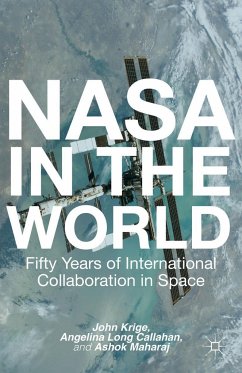The National Aeronautics and Space Administration is all too often thought of in a purely national context - as an American initiative developed specifically to compete with the Soviet Union. Yet, from its inception in 1958, NASA was mandated not only to sustain U.S. leadership in space, but also to pursue international collaboration. Since that time, NASA has participated in over 4,000 international projects, even as historians have almost entirely neglected this remarkable aspect of the agency's work. This definitive and groundbreaking study is the first to trace NASA's history in a truly international context. Drawing on unprecedented access to agency archives and personnel, it explores US-Soviet cooperation during the darkest days of the Cold War, relations with India and Japan, the development of the International Space Station, and a host of other fascinating episodes, making it a signal contribution to space studies and American diplomatic history.
"It tells the story of NASA's collaboration with the European, Japanese, Indian and Soviet space programs in a series of case studies that vary in length and detail. The book analyzes the earthly side of the space agency, with much attention for the practical, every-day side of international cooperation. ... NASA in the World provides important empirical studies of the political and practical sides of international science and technology." (David Baneke, Minerva, Vol. 53, 2015)
"NASA in the World is ... extremely detailed, but it is a study of importance to the history of spaceflight and American diplomacy, European, Russian, Japanese, and Indian area studies, and transnational science and technology since 1958. ... I recommend it." (Michael J. Neufeld, Technology and Culture, Vol. 55, July, 2014)
'Assertions of national pride and global leadership have thoroughly suffused, and often distorted, most US media and historical treatments of the space program. This volume is a long overdue corrective, written by a team led by the preeminent historian of European space exploration. Krige, Callahan, and Maharaj give us as thoroughly researched, complete, and readable an account as one could ask for.' - Sylvia Kraemer, former NASA Chief Historian
'Krige, Callahan, and Maharaj demonstrate that, since the start of the Space Age, NASA engineers and administrators sought to balance national leadership in space with their collaboration and cooperation with foreign partners. NASA in the World is a significant step in helping us see space exploration as both an expression of national foreign policy and a global endeavor.' - W. Patrick McCray, Professor of History, University of California, Santa Barbara, USA
'Far more attention has been paid to competition than cooperation in the history of spaceflight. In this excellent and engaging book, however, the authors make it very clear why studies of cooperation really do matter.' - Robert W. Smith, Professor of the History of Science, University of Alberta, Canada
'By documenting NASA's international relations over its first 50 years, John Krige and his co-authors not only fill a huge gap in NASA history, they bring it to a new level of sophistication and current relevance. Moving beyond nuts and bolts history, the authors admirably succeed in their goal of firmly placing NASA on the world stage, reflecting both the ideals and contradictions of American foreign policy.' - Steven Dick, former NASA Chief Historian
"NASA in the World is ... extremely detailed, but it is a study of importance to the history of spaceflight and American diplomacy, European, Russian, Japanese, and Indian area studies, and transnational science and technology since 1958. ... I recommend it." (Michael J. Neufeld, Technology and Culture, Vol. 55, July, 2014)
'Assertions of national pride and global leadership have thoroughly suffused, and often distorted, most US media and historical treatments of the space program. This volume is a long overdue corrective, written by a team led by the preeminent historian of European space exploration. Krige, Callahan, and Maharaj give us as thoroughly researched, complete, and readable an account as one could ask for.' - Sylvia Kraemer, former NASA Chief Historian
'Krige, Callahan, and Maharaj demonstrate that, since the start of the Space Age, NASA engineers and administrators sought to balance national leadership in space with their collaboration and cooperation with foreign partners. NASA in the World is a significant step in helping us see space exploration as both an expression of national foreign policy and a global endeavor.' - W. Patrick McCray, Professor of History, University of California, Santa Barbara, USA
'Far more attention has been paid to competition than cooperation in the history of spaceflight. In this excellent and engaging book, however, the authors make it very clear why studies of cooperation really do matter.' - Robert W. Smith, Professor of the History of Science, University of Alberta, Canada
'By documenting NASA's international relations over its first 50 years, John Krige and his co-authors not only fill a huge gap in NASA history, they bring it to a new level of sophistication and current relevance. Moving beyond nuts and bolts history, the authors admirably succeed in their goal of firmly placing NASA on the world stage, reflecting both the ideals and contradictions of American foreign policy.' - Steven Dick, former NASA Chief Historian








